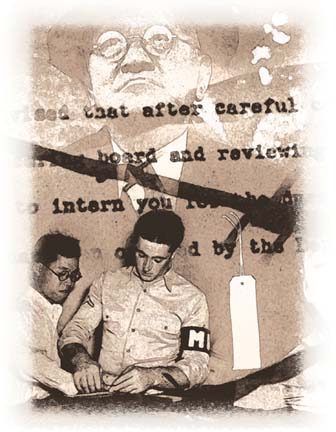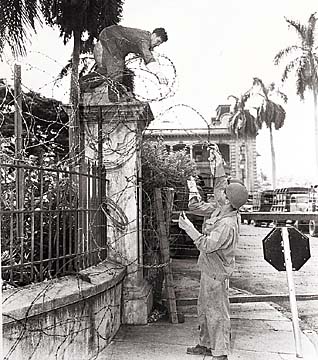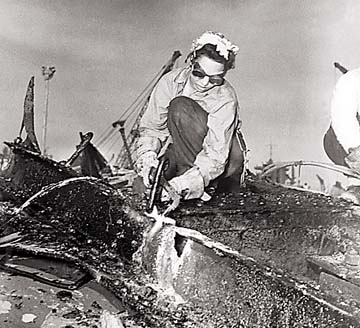


Martial law
held sway in isles
for three years
People here lost their rights
By Richard Borreca
under military government
after Pearl Harbor attack
Star-BulletinJust a few hours after the last Japanese planes returned to their carriers on Dec. 7, 1941, a revolution happened in Honolulu.
The U.S. military took over the Territory.
Martial law, so far-reaching that it controlled and in many cases halted the freedoms of citizens in Hawaii, had been planned by the military nearly a year before.
The afternoon of the Pearl Harbor attack, Lt. Gen. Walter Short met with Territorial Gov. Joseph Poindexter.
"He (Short) requested and urged martial law, saying for all he knew, landing parties were en route," Hawaii Secretary of State Charles Hite recalled in his diary. "Apprehensive about local Japs. Said all saloons, movie houses and public places should be closed."
At Iolani Palace, Short - the top Army commander here - said martial law would be lifted in a "reasonably short time." Poindexter signed.

Martial law was not to be lifted soon; freedom did not return to Hawaii until Oct. 24, 1944.According to U.S. Army records, the proclamations issued by Gen. Short were already in a special file in March 1941. "Plans were also made for the creation of a military judicial system to augment or replace the civilian courts."
"The large number of aliens in the Hawaiian Islands is a matter of grave concern to our national government and years of study by civilian, military and naval authorities, of the probable attitude of certain of the island-born Orientals has led to the conclusion that but doubtful reliance can be placed upon their loyalty to the United States in the event of a war with an Oriental power," the report quotes an unnamed "civilian educator" as saying.
As military governor, Short assumed the powers of the courts and suspended the writ of habeas corpus, the judicial process which determines the legality of a person's detainment or imprisonment.
Liquor sales were banned, later to be allowed in a limited fashion.
Newspapers and radio stations were closed; some later reopened but with censors approving all material.

Civilians had to be fingerprinted and carry registration cards."Hawaii is not a conquered nation," the Democratic territorial platform complained in 1942. "Imposition of martial law over this loyal American Territory is contrary to every tradition of America."
But, the new laws were enforced.
Citizens were forbidden to carry more than $200 and people were not allowed on the streets after 8 p.m.
All long-distance telephone calls and mail to the mainland was censored. Calls had to be in English, so the censor listening in could understand the conversation and monitor the morale of various ethnic groups.
One of the strictest rules of martial law was the nightly blackout, with all doors and windows covered.
"We couldn't see each other nor anything on the table so we literally had to feel our way through the meal. If you reached out for something you'd be liable to stick your finger in the butter or in somebody's eye," Honolulu resident Richard Wrenshall wrote in a 1942 letter.
To keep everyone working toward victory, workers were not allowed to switch jobs. Wages were frozen and in some cases, travel between the islands was restricted.
Rule violators were arrested and tried by the next morning; nearly everyone tried was found guilty. Punishment ranged from fines and jail time, to being forced to donate blood.
District Court Magistrate Frank McLaughlin, in a speech after martial law was lifted, criticized Short's rule. "He set up an unconstitutional provost court system to try, without constitutional safeguards, anybody for anything -- and they did it, too."